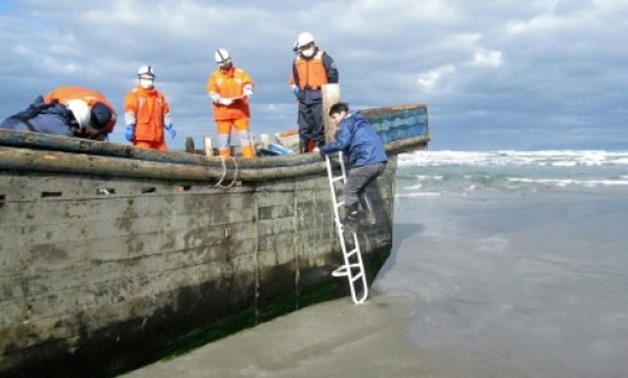
© JIJI PRESS/AFP/File / by Kyoko Hasegawa with Hwang Sunghee in Seoul | Dozens of North Korean fishing vessels wash up on Japan's coast ever year, but last month Japanese coastguards registered 28 cases, the highest monthly number since records began in 2
TOKYO - 6 December 2017: A severe shortage of food and foreign currency as international sanctions bite are contributing to a fresh wave of North Korean "ghost ship" fishing vessels washing up in Japanese waters, analysts said.
Exacerbating the phenomenon is the fact that North Korea has sold fishing rights to China in a bid to raise hard currency, forcing fishermen -- often sailing rickety vessels -- further out towards Japan in search of a catch.
Dozens of North Korean fishing vessels wash up on Japan's coast ever year, but last month Japanese coastguards registered 28 cases, the highest monthly number since records began in 2014.
There has been a record number of North Korean fishermen rescued alive -- 42 this year compared to zero in 2016 -- but there are still cases of "ghost ships" packed full of bodies, with 18 corpses recovered so far this year.
Japanese authorities say it is often hard to determine exactly how they died as the boats often drift for months before washing up in Japan.
"Fishermen are desperate to meet annual catch goals, which are elevated to higher levels every year," Toshimitsu Shigemura, professor emeritus of Waseda University and North Korea expert, told AFP.
North Korean leader Kim Jong-Un ordered an increase in fishing when he took power in 2013, analysts noted.
"Since then, fishermen have been frantically trying to meet (annual) catch goals, but what's different this year is that they are travelling to distant waters in their fragile boats," said Pyon Jinil, a leading North Korea watcher and writer based in Japan.
"North Korea last year sold part of its fishing rights in the Yellow Sea to China to get foreign currency, so their fishermen have been kicked out of the western part of their waters," he said.
"So this year, Kim Jong-Un ordered his people in a New Year address to 'establish a fishing base in the Sea of Japan'," Pyon said.
Yang Moo-Jin, professor at the University of North Korean Studies in Seoul, concurred, adding: "Because they can't fish in their own waters, they have to go farther out."
"North Korea's fishing boats are quite old and they don't have much fuel... so they naturally end up adrift and float into Japan," said Yang.
There is also the backdrop of a severe food shortage, partly linked to international sanctions, analysts said.
Food rationing has been stepped up with "every North Korean person now receiving only 300 grams of food per day," noted Pyon.
"In order to plug the shortages of staple food like rice and corn, they want to buy from China, but they don't have hard currency to buy food, either," he said.
North Korea's foreign reserves have shrunk to one third of what it held last year because of new rounds of sanctions imposed by the United Nations Security Council -- two this year and nine in total, he noted.
- Spies, with shabby boats? -
Japanese media have provided blanket coverage of boats landing coming from the North, with some speculation they may be spy ships.
Transport Minister Keiichi Ishii has said he is "boosting efforts to investigate Japan's coastal areas" following a surge in suspicious boats drifting or washing ashore.
And top government spokesman Yoshihide Suga told reporters Tuesday the government was "investigating cautiously including whether they are fishermen or not," amid media reports that one of boats carried a sign reading "(North) Korean People's Army."
But Shigemura played down the possibility they are spies from Pyongyang.
"Japan is very easy to sneak into and spies can enter the country any time if they wish," he said.
"North Korean agents don't come in such clapped-out boats. They come in vessels with proper equipment for sailing," he said.
One of the latest groups of North Korean fishermen spotted off Japanese waters is suspected of stealing a variety of items -- including fridges, TV sets and a door knob -- before reportedly dumping some of them into the sea before Japanese coastguard investigated them.
"They wanted to sell them back home," Shigemura said.
"But if they go home -- after thorough investigation by Japanese police -- they would be executed as authorities fear they must have been turned into Japanese spies," the professor said.
by Kyoko Hasegawa with Hwang Sunghee in Seoul


Comments
Leave a Comment